Gelsenkirchen-Buer Nord station
Buildings and structures in GelsenkirchenRailway stations in Germany opened in 1998Rhine-Ruhr S-Bahn stationsS9 (Rhine-Ruhr S-Bahn)

Gelsenkirchen-Buer Nord station is located in the city of Gelsenkirchen in the German state of North Rhine-Westphalia. It is on the Gelsenkirchen-Buer Nord–Marl Lippe railway. The current station was opened in 1998 and is classified by Deutsche Bahn as a category 6 station as a halt (Haltepunkt). It replaced a station 600 metres to the southwest, which had been opened in 1905.
Excerpt from the Wikipedia article Gelsenkirchen-Buer Nord station (License: CC BY-SA 3.0, Authors, Images).Gelsenkirchen-Buer Nord station
Königswiese, Gelsenkirchen Buer (Gelsenkirchen-Nord)
Geographical coordinates (GPS) Address Nearby Places Show on map
Geographical coordinates (GPS)
| Latitude | Longitude |
|---|---|
| N 51.586908 ° | E 7.050332 ° |
Address
Gelsenkirchen Buer-Nord
Königswiese
45894 Gelsenkirchen, Buer (Gelsenkirchen-Nord)
North Rhine-Westphalia, Germany
Open on Google Maps








